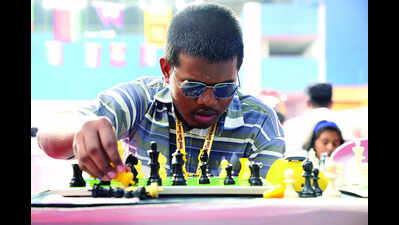Trending
‘Only in chess, a blind player can play on a par with the sighted’
Panaji: Helped to his seat by a friend, Rahul Sahani is a few minutes early for his second-round clash at the Shyamaprasad Mukherjee stadium in Bambolim. He adjusts his chair and then feels the chess pieces on the board, all of them in order.
With a couple of minutes still on hand and the opponent not around, Sahani then makes mental notes, visualising his moves at the Manohar Parrikar Goa International Open Grandmaster chess tournament.
If playing chess and winning is tough, imagine doing it with your eyes closed. Totally blind, Sahani has been doing it for a few years now, notching impressive wins.
At a recent tournament in Bhilwara, Rajasthan, he finished seventh, a huge achievement for a visually impaired player.
Sahani is not alone at Bambolim. There are five other visually impaired players, mostly from Gujarat, testing their might against ambitious players in the C category, reserved for those with rating points of below 1700. Two of them picked up wins in the first round on the opening day.
“Chess is the only sport in the world where a blind person can compete on a par with sighted person, without making any compromises to the rules,” said Prince Akediwala, who won his first-round match and then drew the other two on Thursday. “What we lack is coaching. Chess is an expensive sport, and experienced coaches are not easily available, if you don’t have the (financial) resources. If we get good coaching, we can make big progress.”
Good coaches, Akediwala said, typically charge Rs 1,000 for an hour, out of reach for players who come from lower middle-class families.
With an international rating of 1632, Akediwala is the highest rated player among the six in Goa. Amit Deshpande is the seniormost and he proved himself in good measure with two wins in the first three rounds.
“Chess is becoming very competitive with plenty of visually impaired players making their presence felt, particularly in the junior category from south India. There are more opportunities and plenty of rewards if you do well,” said Deshpande, who’s been competing nationally for over 25 years.
Five of the six players competing here are from Gujarat and know that their lives can change for good, if they taste international success. All of them have inspirations from the state itself. Darpan Inani, for example, won individual and team chess gold at the Para Asian Games 2023, earning himself a class one job with the Gujarat government.
Himanshi Rathi, a bronze medal winner at the Para Asian Games, is another example.
“I want to become an International Master (IM) and then, if all goes well, hopefully even a Grandmaster,” said Aniket Patni, a totally blind chess player.
In general, IMs are usually rated between 2400 and 2500 for classical FIDE ratings. At 1532, Aniket, son of an auto driver, has plenty of ground to cover.
Visually impaired players use a Braille chess board where they figure out black or a white square by feeling the raised or the lowered squares. The shape of the piece also helps them determine whether the piece is a pawn, rook, bishop, knight, queen or king.
When up against sighted players, they are alerted after the opponents announce the move aloud. Also, instead of writing the moves on a scoresheet, the visually impaired player writes the moves in Braille or records the moves on a device.
“We are here in Goa to gain valuable experience,” said Akediwala. “We go into every tournament believing we can compete with anyone. The correct mindset is very important, because if you have a strong mind, you can achieve great things. Of course, with chess, finance plays a big role, but that cannot hamper our preparations. We prepare as a team with YouTube videos and help from seniors. The Gujarat Chess Association for Visually Challenged is also of great help and hopefully we can realise our dreams soon.”
At least in Goa, they are on the right track.
End of Article
FOLLOW US ON SOCIAL MEDIA
Visual Stories
Hot Picks
TOP TRENDING
Explore Every Corner
Across The Globe





















